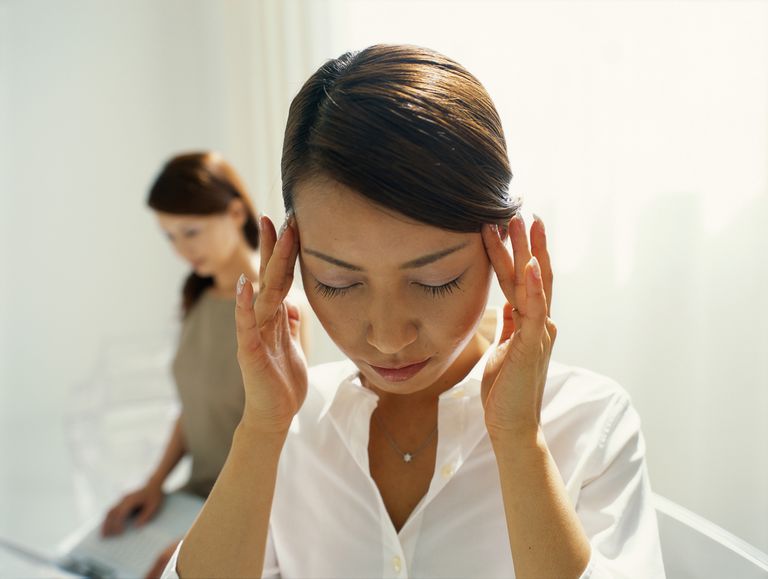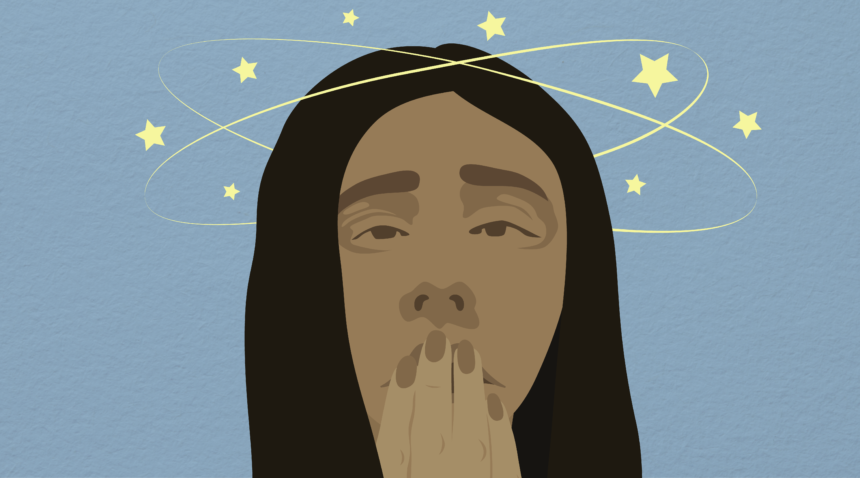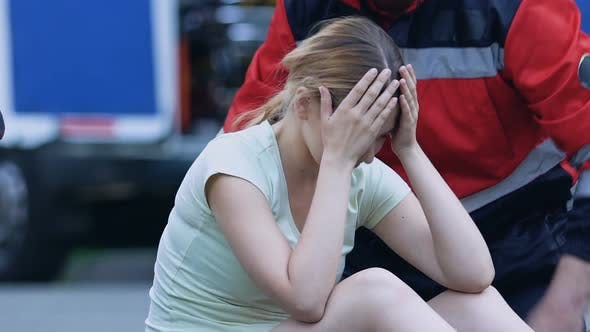What can cause dizziness?
 |
Dizziness is a symptom, not a medical diagnosis. And it’s a symptom that is often accompanied by other symptoms such as lightheadedness.
What can cause dizziness? The list of possibilities is long, but I’m about to tell you many of them.
What Is Dizziness?
According to the Mayo Clinic, dizziness is a term used to describe a range of sensations including feeling faint, woozy, weak or unsteady. When dizziness makes you feel like you or your surroundings are spinning or moving this is medically referred to as vertigo.
Dizziness is a symptom that can be caused by dozens of other health problems. The possible causes fall into several categories, including cardiac, neurologic, obstetric or gynecologic, and ear/nose/throat-related. Dizziness is often accompanied by other symptoms, too, such as headache, nausea or feeling lightheaded and dizzy.
Dizziness can last for just a few seconds, minutes, hours or even months. It’s a symptom that can be complex and it’s not always related to the vestibular (inner ear) system. Sometimes it is a sign of something more serious (more on that in the “causes” section below).
Symptoms of Dizziness
What are the symptoms of dizziness? When people say they are feeling dizzy then they are describing a perceived sensation of movement like rocking, spinning or whirling even though they are not actually moving. Sometimes, when someone says they are dizzy, it feels as though the room is moving around them.
Since dizziness is frequently a multicomponent symptom it is sometimes medically pided by the following accompanying symptoms:
Lightheadedness: a vague sensation that one is floating or feeling woozy.
Presyncope: a more extreme form of lightheadedness that can be accompanied by tachycardia, palpitations, or excessive abnormal sweating.
Vertigo: a sensation of movement, often described as a spinning, twisting, or turning.
Dysequilibrium: a sensation of unsteadiness.
Many times dizziness is accompanied by other symptoms including:
Faintness or lightheadedness
Feeling off balance
Actual fainting
Confusion
Weakness
Tiredness
Headache or head pressure
Chest pain or tightness
Nausea or vomiting
Causes & Risk Factors
There are at least over 80 possible causes of dizziness. Here are some of the top known causes:
Heart-Related
Atrial fibrillation: Irregular, sometimes fast heartbeat causing poor
circulation and other cardiovascular problems.
Tachycardia: An abnormally rapid heart rate.
Hypotension: The medical term for low blood pressure (less than 90/60).
Atherosclerosis: A condition where the arteries become narrowed and hardened due to a buildup of plaque around the artery wall.
Heart disease: Refers to a number of heart conditions that include diseased vessels, structural problems, and blood clots.
Brain and Nerve-Related
Vertigo: A condition in which someone feels dizzy, often as though the room is spinning. Vertigo can be brought on by changing the position of the head. For example, benign paroxysmal positional vertigo (BPPV) can cause dizziness when lying down or when standing up.
Meniere’s Disease: A chronic inner ear disorder that causes dizziness, tinnitus, vertigo and other symptoms typically associated with the abnormal fluid collection in the inner ear.
Stroke: When a blood vessel that carries oxygen and nutrients to the brain is either blocked by a clot or ruptures.
Fibromyalgia: A disorder characterized by widespread musculoskeletal pain accompanied by fatigue, sleep, memory, and mood issues.
PTSD (Post traumatic stress disorder): A disorder in which a person has difficulty recovering after experiencing or witnessing a terrifying event.
Post-concussion syndrome: A complex disorder in which various symptoms, such as dizziness and headache, last for weeks and sometimes months after the injury that caused the concussion.
Altitude sickness: Also known as acute mountain sickness (AMS), this is a negative health effect caused by acute exposure to low amounts of oxygen at a high altitude.
Migraine: A headache of varying intensity, often accompanied by nausea and sensitivity to light and sound.
Hangover: Unpleasant symptoms that occur after excessive alcohol intake.
Motion sickness: Illness caused by motion during travel.
Caffeine overdose: Can occur when you consume too much caffeine through drinks, foods, or medications.
 |
Ear/Nose/Throat-Related
Common cold: A common viral infection of the nose and throat.
Flu: A contagious respiratory illness caused by the influenza virus.
Middle Ear Infection: An infection of the air-filled space behind the eardrum (the middle ear).
Tinnitus: The perception of noise or ringing in the ears.
OB-GYN–Related
Pregnancy: The time during which one or more offspring develops inside a woman.
Menopause: A natural decline in reproductive hormones when a woman reaches her 40s or 50s.
Endometriosis: A disorder in which tissue that normally lines the uterus grows outside the uterus.
Toxic shock syndrome: A systemic bacterial infection that can come on suddenly and be fatal.
Again, these are just some of the possible causes of dizziness. Other common causes that don’t fit into these categories include:
Anemia
Anxiety
B12 deficiency
Dehydration, which can sometimes be caused by a fever, being overheated, hypoglycemia, and medication side effects.
If you’re feeling dizzy and are currently taking medication, make sure you thoroughly read the possible side effects of your medication.
Dizziness can also be a side effect of some tools used to quit smoking such as the nicotine patch and nicotine gum.
Risk factors for dizziness include, but are not limited to, the following: head or ear trauma, viral ear infections and age. Anyone of any age can feel dizzy, but this complaint is heard more and more as people get older and is the top symptom behind medical visits for people over the age of 75.

Precautions
If you’re assisting someone who is dizzy, have them sit down or lie down. Make sure to avoid sudden position changes and bright lights as much as possible. If the inpidual is thirsty, you can give them fluids.
Call for medical help immediately if you or someone you know is dizzy and experiences any of the following:
A change in speech such as slurred speech
A change in vision including double vision
Shortness of breath
Chest pain
Rapid, irregular or very slow heartbeat
Fainting or loss of consciousness
Fever and stiff neck
Convulsions
Ongoing vomiting
Dizziness that comes after a head injury
Inability to move an arm or leg
Numbness or tingling
5 Natural Treatments for Dizziness
Resting and hydrating, especially if you’re dehydrated and/or overheated
Trying acupuncture
Cutting back on caffeine and alcohol since overconsumption of both can cause dizziness
Checking your B12 levels and eating more foods high in B12 like grass-fed beef and wild-caught salmon
Reducing anxiety and stress on a daily basis. Anxiety can bring on dizziness and dizziness can also make you feel anxious./.
( By Annie Price, CHHC )
Recommended
 Handbook
Handbook
Vietnam Moves Up 8 Places In World Happiness Index
 Handbook
Handbook
Travelling Vietnam Through French Artist's Children Book
 Multimedia
Multimedia
Vietnamese Turmeric Fish among Best Asian Dishes: TasteAtlas
 Handbook
Handbook
From Lost to Found: German Tourist Thanks Vietnamese Police for Returning His Bag
 Handbook
Handbook
Prediction and Resolution for the Disasters of Humanity
 Handbook
Handbook
16 French Films To Be Shown For Free During Tet Holiday In Vietnam
 Handbook
Handbook
Unique Cultural and Religious Activities to Welcome Year of the Snake
 Handbook
Handbook
